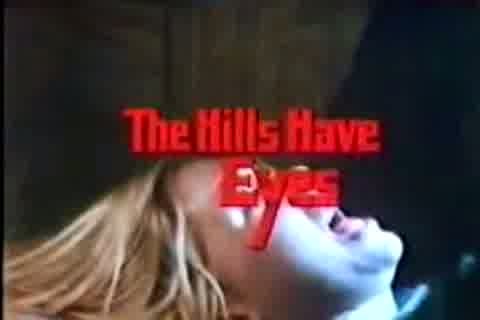Réalisation:
Wes CravenScénario:
Wes CravenPhotographie:
Eric SaarinenMusique:
Don PeakeActeurs·trices:
Suze Lanier-Bramlett, Robert Houston, Martin Speer, Dee Wallace, Russ Grieve, John Steadman, Virginia Vincent, Michael Berryman, Lance Gordon (plus)Résumés(1)
Originaire de l'Ohio, la famille Carter traverse les États-Unis en caravane pour se rendre à Los Angeles. Le père souhaite faire un détour par le désert du Nevada pour visiter une mine d'argent, sans savoir que celle-ci se situe au niveau d'une zone d'essai de l'aviation américaine. Les Carter sont bientôt victimes d'un accident et doivent se séparer pour aller chercher du secours. Mais ce qu'ils ignorent, c'est qu'une étrange famille de cannibales est en train de les espionner... (Carlotta Films)
(plus)Critiques (6)
La réponse de Wesa Craven à "The Texas Chain Saw Massacre". Mais d'un niveau inférieur. Son environnement désertique est tout aussi oppressant et sa musique de synthétiseur étrange lui confère la bonne dose d'effroi, mais la famille de cannibales n'est qu'une bande de pitres pitoyables et ne représente en aucun cas la nature terrifiante et crédible des Chainsaw. Nous les voyons avec désinvolture de jour, de nuit et dans des situations qui les rendent simplement ridicules. Les scènes aux alentours de leur repaire et leur propre mère avec une coiffe indienne rappellent "Winnetou". Cependant, la première partie du film est très atmosphérique et extrêmement cruelle.
()
Five years passed between the release of Wes Craven’s directorial debut, the still disturbing The Last House on the Left, and his second film. As with that earlier film, he not only directed The Hills Have Eyes, but also wrote the screenplay and did the editing himself. The plot couldn’t be any simpler: the American middle class is confronted in the middle of the desert with something whose existence is not acknowledged in the safety of the home. A family of Republicans (their political leanings are apparent from their warm relationship with guns and hypocritical faith in God) is about to become intimately familiar with a family of degenerate cannibals. The film is notably less intense and disturbing than the thematically similar The Texas Chainsaw Massacre. What I miss is especially the dinginess of Hooper’s cult hixploitation flick; in the best case, even the cannibals here look like a gang of bandits from a television fairy-tale for kids. They don’t arouse fear and we don’t see much of the violence that they carry out. Because there is nothing to be afraid of, The Hills Have Eyes works better as “mirror held up to society” than as a horror film eliciting a feeling of dread. It is worth noting that Craven didn’t employ the usual division between technological and pre-technological societies, as the savages also use modern technology; they have simply learned to control the achievements of civilisation, regardless of how uncivilised they are themselves. Furthermore, in their use of technology, they achieve better results than the protagonists, who are repeatedly let down by otherwise reliable gadgets, mostly at the moment when they want to kill someone with them. They manage to get the killing done only by using more barbaric means (an axe, a dagger) requiring hand-to-hand combat. In other words, if you want to survive in the wilderness, you have to become a savage yourself. This psychologically dense (the loss of the father, the mother’s fear of snakes, Pluto’s frustration from being denied sex) film ends at the moment the monster inside of us is revealed, at the moment of the direct attack on the camera. There is no epilogue that would restore the status quo. Deal with it the best you can, dear viewer. Deprived of a sense of security like the whole family in the film, we are the main victim. Very unsettling, very Craven. 65%
()
Aja’s remake is so good, that (given its the average rating) I ignored Craven’s original for a pretty long time. Which was a mistake, it’s a surprisingly good horror flick. If there’s something that elevates it above the remake are the redneck cannibals, here they differ both in appearance and character, so they are proper characters instead just murder machines, as in the modern version. And they look so prehistorical, like Neanderthals, I loved it. For one hour, the film is basically excellent – atmospheric, brutal, terrifying. It’s a pity then that the third act slides into a relatively boring massacre, and in daylight to boot. So the final impression is a bit lower, but overall, almost unexpected satisfaction.
()
If Craven had done one thing better and set the communicativeness solely on the level of the victims, this could have been one of the best horror films of the 1970s. This way, what remains is an experience of a hopelessness and assorted murders, but degraded by the frequent depiction of a ridiculous cannibal family and their demented dialogue. Fortunately, at least Alexander Aja's remake successfully eliminated almost all the shortcomings.
()
La vision sadique de Craven sur la façon dont des vacances familiales peuvent mal tourner. J’ai du mal à imaginer à quel point ce film a dû choquer à l’époque de sa sortie. Bien qu’il choque encore aujourd’hui.
()
Naive townies versus cannibal savages in the California desert. The former search for an inherited silver mine and get stuck there, the latter live there. The film is about the struggle of two different families, one killing to survive and the other to eat and thus actually survive. Later on, it turns out that the urban family is not so different from the savage one when it is cut off from civilization and modern technology. In order for the townspeople to stand up to the savages in the wilderness, they must also become savages. You can see a kind of social commentary in this, or just an insane B-movie killing spree, that's up to you. Wes Craven is great at evoking the atmosphere of an inhospitable wilderness, but the film is more likely to be recommended only to fans of cinematic perversions, Craven and the bald dude Michael Berryman.
()

